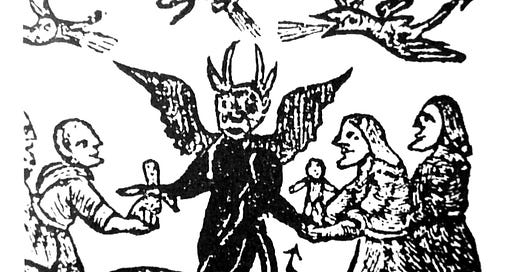Myself and a handful of dear friends were recently gathered around the question, do we believe in demons? If so, how? In what fashion? For what reason? To what ends? What are the social and political energies of these sorts of beliefs? What are the possibilities and pitfalls of a world that ponders re-enchantment?
What follows became a rather long reflection on some threads of the matter, including my misgivings about the crude political exploitation of supernatural beings on one hand, and the rationalist’s abolition of them on the other. Even if neither of these outcomes are objectionable to the more mischievous members of the demonic community, I, at least, have questions about how they’re weaponised by the colonising imagination.
I have very little explanation for the things I believe in. That is, I have no apologetics style rationale for such things; no evidence or proofs. Obviously I'm aware that my inherited traditions and personal experiences have shaped what I believe in, but these aren’t anything to the world of rational argument. If they are, I have no inclination to use them that way. I’m not interested in that sort of thing. I’m happy to accept that I believe in this or that, and that others may believe in the same things or other things or what have you. I seem to have just taken it as read that people believe what they believe, and I feel little compulsion to interrogate the veracity of anyone's beliefs.
On the other hand, I am deeply interested in the social and political and psychological functions of our beliefs. What do they do for the individual, or the community. How do they shape us? How do we use them? For what? Against whom?
In some fashion or other, I believe in demons and angels and otherworldly things. I always have done. I've inherited these beliefs and lived them, and interpreted my own experiences, rather lightly, through them. I've spent very little time and energy asking myself why, but I instinctively find myself asking what function these beliefs are serving, for myself and for others. Are they giving tangible form to hidden fears? Are they bringing meaning to situations that feel meaningless? Do they form a foil of evil against which to define one's own righteousness, or an image of goodness to reach toward from the gutter? Are they offering mystery to a dull experience, or hope to a sisyphean prison?
I suspect myself of some wary pact with the ghosts of the enlightenment, who are certainly no friends of mine. I reject their dogma that nothing should be believed in, except that which can be proved by rational argument or empirical evidence. On the other hand, perhaps I have taken it into my heart that there is something indecent about impressing truth claims upon the world from the murky realm of belief. I have tended to confine myself, therefore, to exploring the uses and functions of such beliefs alongside their irreligious counterparts.
I also suspect that I am sometimes suspected of being an unbeliever. Would a true believer think along these lines? Would they not bear witness to the belief itself? Well, whether I am believed or not is out of my hands, but I can attest in good conscience that I am a sincere, if bedraggled believer in all kinds of things considered quite fantastical. And yet, it is the fruits of such things I want to understand: how these things are played out in the world between us all. Here, I think, discourse and dialogue becomes meaningful; all the more so where interlocutors begin from difference. I would like to work at illuminating the fruits of belief, even from my one small partial hill. Whatever tree one might encounter can certainly be encountered through the fruits, as I once heard it said.
A Conservative Reads the Demons of the Past
The occasion for this piece of writing was a friend's provocation. The question was put on the table before a dozen of us: do you believe in demons? Why? How? What is to be made of such beliefs these days? They are perhaps not so uncommon as they used to be. A few essays were put on the table also; some exemplary discourses of the present. One was by the writer Rod Dreher, who I had heard of, but had never yet read.
Keep reading with a 7-day free trial
Subscribe to David Benjamin Blower to keep reading this post and get 7 days of free access to the full post archives.



